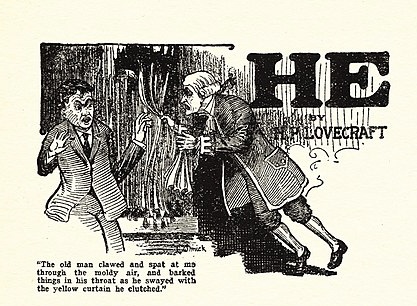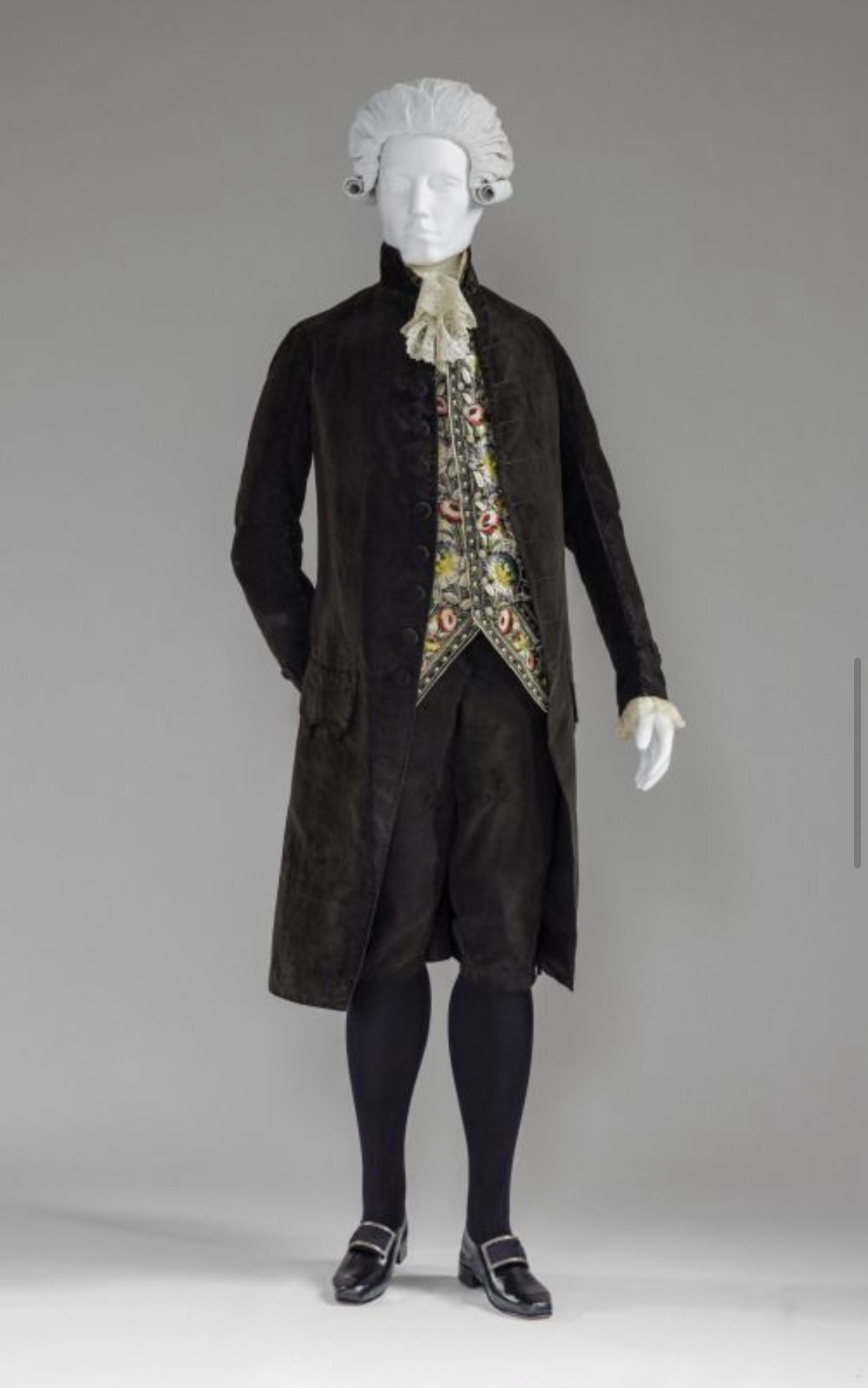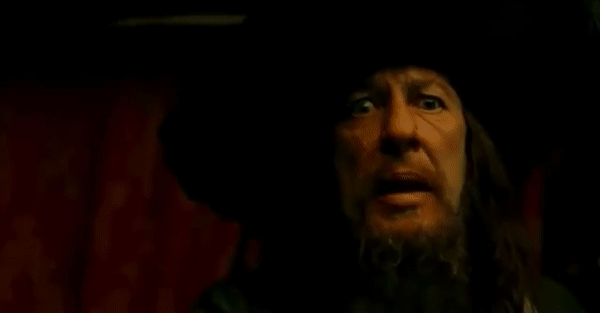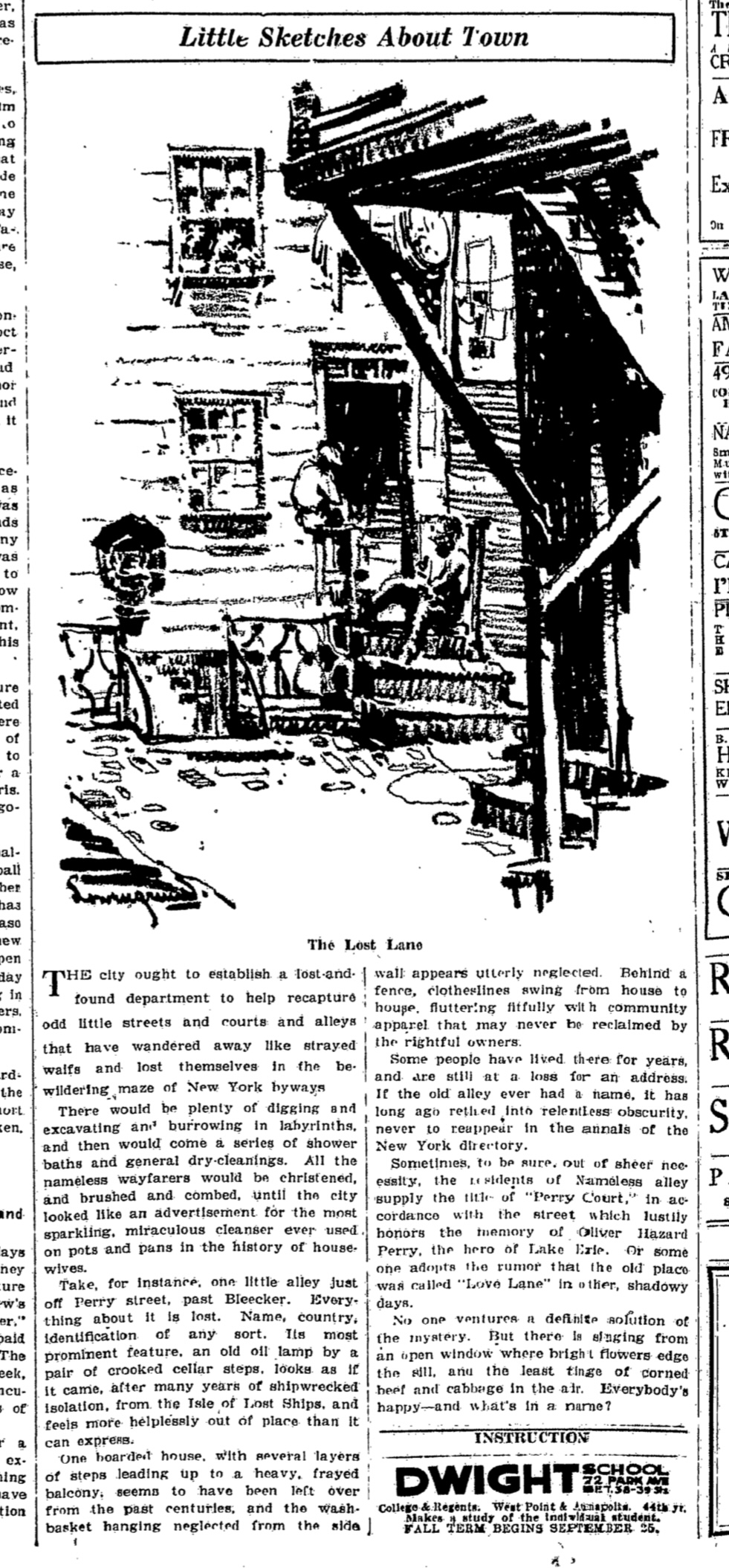Our narrator is an aspiring New England poet who has moved to New York City for artistic inspiration, expecting it to be full of old beauty and culture. Instead he finds it lifeless and ugly, disillusioned by all the foreigners running around ruining the place. (Shocking.)
The poet meets an elderly man (the titular He) late one night while sulking in an old part of the city. The old man recognises him as someone else obsessed with the good old days and offers to show our easily serial-killable poet something to satisfy his obsession with the antique.
The poet follows the old man through long stretches of alleyways and ancient courtyards to his home atop a steep hill. He leads the poet up to his library and finally removes his traveling cloak to reveal a full vintage fit.
Like it’s owner, the house is old, seemingly untouched from the early 1700s. The old man explains that he maintains the dress and mannerism of his ancestors, and the estate they are in has been in his family since before Greenwich and New York were constructed around it.
His ancestor, a squire, built this house on a hill important to the Native peoples. The natives would come up to the hill every full moon night to perform ~strange rituals~, even attempting to sneak back onto the grounds once the estate was built.
One night in 1768, the squire observed their ritual and made a deal with them for access to the area in exchange for knowledge of their magic. However, once he learned the ritual the squire poisoned them all and became the only person alive who knew the secret of the land.
The squire would go on to study all sorts of magic and the old man demonstrates some for the poet now, directing him to the library’s window. He instructs the poet to be quiet and with a wave of his hand the landscape outside flashes to a vision of the land before colonization.
With another wave it flashes ahead to old Greenwich. The old man explains he can manifest visions of any time period, past or future and shows the poet an apocalyptic glimpse of the future.
Shocking.
The poet screams in fear at the vision. When he finally stops the two realise there is another sound now, that of people coming up the stairs and the rattling of the library door handle. The old man lashes out at the poet for drawing the attention of the Native American ghosts and tears down the window curtains in a fit of rage.
As moonlight floods the room the poet sees the mansion and old man as they are -ancient, rotting corpses- and it is revealed that the old man was the same squire from all those centuries ago.
The decomposing squire tries to attack the poet until the study door is broken open. Rather than people, a shadowy ooze pours into the room and swallows up the squire before disappearing.
The poet is left alone as the mansion rots and crumbles. He is barely able to escape as the place literally collapses around him and is found the next morning having dragged himself to safety on broken bones.
He decides to leave New York and return home to New England.
TL;DR:
An angsty poet goes home with an evil pilgrim wizard and watches him get murdered by angry Native American ghosts.
Our first clunker! Unfortunately for me, it would be pointless to just review all the good stories first so I’ve got to start adding in some trash.
He is a very plain ghost story with none of the classic cosmic horror flavour that usually makes H.P.L. stories so tasty. (unless the cosmic horror here is being surrounded by immigrants which, yeah is on brand)
There are brief references to Call of Cthulhu like imagery in the old man’s vision of the future, but otherwise the only cool part is the Pirates of the Caribbean moonlight reveal.
The most interesting thing about this story is the semi-autobiographical peek into H.P.L.’s headspace at the time. Lovecraft moved to New York City in 1924 when he married Sonia Greene and he HATED it.
Not at first, but in 1925 as Sonia began travelling the country for her work, Lovecraft would live by himself in a small apartment in Brooklyn’s Red Hook neighbourhood ((LOUD OMINOUS FORESHADOWING)) and started to detest the city. Pretty obvious, since the first 5 WHOLE PARAGRAPHS of Heare just about how much NYC sucks.
As for the actual story content…
Look, the most generous reading I could possibly give this is that it’s actually a condemnation of antiquarian thinking.
An angsty, racist poet longs for the good old days, meets a pilgrim (yeah, yeah, I know he’s not actually a pilgrim) obsessed with maintaining history who then gets killed by the ghosts of people he’s wronged. Seems pretty direct.
But I don’t honestly believe that.
Maybe if penned by a different author of whom we knew less of their… personal politics it could read as a clunky and poorly aged story about the dangers of idolising the supposed Good Old Days.
But this is Lovecraft. Any vaguely critical thing I think this story has to say is almost certainly coincidental. The historical fetishism is definitely genuine, Lovecraft was one of those Born-in-the-Wrong-Era types - except that golden era was the 18th century.
Plus it’s got all that ~Native American magic~ stuff that would be racist regardless of how you’re supposed to view the main characters.
The only other thing I have to comment on is how hilariously dumb the poet comes off as. This guy hates New York SO much he will ignore ANY red flag.
Dude.
Now you might argue that any amount of racism is an unacceptable amount of racism, and you’d be correct! But this is an H.P.L. review blog so we are going to need some way to quantify these stories from zero to like, Red Hook.
So we’ll need separate metric outside of the star ranking system to judge racism on. Something totally random…
Hmm. I don’t know, let’s use cats.
This story gets 5 out of 5 on the cat racism scale for extreme xenophobia and Native American racism in particular, both in the language used to referred to them and the premise of ~Native American magic~ as a whole
I’m a bit worried about setting the bar here when I know it gets worse than this, so you can choose to read it as a 4/5 depending on how cool you think it is that they kill the old racist in the end.
· Published in the September 1926 issue of Weird Tales. It was published 5 months after Lovecraft himself left NYC to return to Providence.
· The story was apparently written in a day after Lovecraft spent a whole night touring the old part of the city.
· According to S.T. Joshi, the old court off Perry Street actually exist(ed)s and Lovecraft first read about it in a New York Evening Post article on August 29, 1924. Transcript here.
· The unidentified Native Americans in the story would likely be Lenape. Although I’m certain H.P.L. neither knew nor cared about that fact, and frankly, associating the Lenape people with this story at all feels like doing them a disservice. But, y’know, maybe go learn about them. I can confidently say they never actually practiced full moon time magic.




